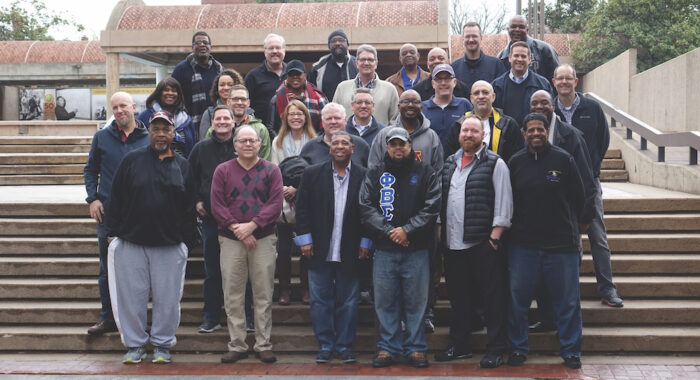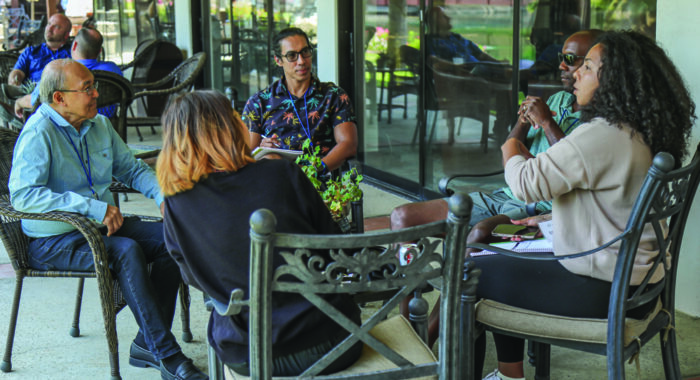As a young adult, I was torn between a career in public policy or pursuing vocational ministry. Eventually, God’s call to pastoral ministry became clear — fueled in part by a conviction that the local church was Christ’s Plan A for transforming the world.
I am grateful for how both paths have converged in my role as advocacy director with the National Association of Evangelicals. It is my joy to help evangelical pastors, leaders and believers understand how advocacy can be an expression of our discipleship as followers of Jesus.
For more than 80 years, the NAE has helped our diverse network of evangelical denominations, networks, schools and nonprofits courageously apply the gospel and biblical principles to the issues of the day.
The NAE resource, “For the Health of the Nation: An Evangelical Call to Civic Responsibility,” equips Christians to address issues impacting our nation — whether protecting religious freedom, safeguarding the sanctity of human life, pursuing racial justice and reconciliation, or advancing wise stewardship of God’s creation.
One aspect of my work is to equip and encourage evangelical leaders and believers to seek justice and compassion for the poor and vulnerable. We work with trusted partners to explain how poorly conceived policies impact marriages, families and kids. Whether among Black and Brown communities or newer Americans, many have experienced discrimination, trauma or even persecution. Yet current policies keep many trapped in cycles of poverty, uncertainty and recurring trauma.
A few years ago, I invited a pastor friend of mine to a NAE-sponsored event on standing with the vulnerable. He brushed me off, saying this was simply “mission drift” from the evangelistic mission of the Church.
I have come to believe, however, that seeking justice and compassion for the poor and vulnerable, or addressing other issues outlined in “For the Health of the Nation,” are neither niche issues nor distractions from the gospel.
I have seen how those who struggle are often most open to Jesus. It has often been “the widow, the orphan, the poor and the foreigner” who have demonstrated Jesus most clearly to me — whether an elderly person, a child, someone in recovery or returning from prison, or an immigrant.
When I talk with refugees or asylum seekers, for example, I note that many self-identify as evangelicals. These are our brothers and sisters in Christ. Many have endured persecution for their faith. “Don’t forget to show hospitality to strangers [foreigners],” the writer of Hebrews reminds us, “for some who have done this have entertained angels without realizing it!” The writer continues, “Remember also those being mistreated, as if you felt their pain in your own bodies” (Hebrews 13:2-3b, NLT).
We take risks when we step forward to stand with those who have been mistreated and advocate a better life for them. It is not always popular to make waves or love those that some consider enemies. Yet as we study the Scriptures and follow the teachings and examples of Jesus, we know these priorities reflect the heart of Christ.
I often say that civic engagement must never take the place of the relational, evangelistic and compassionate work of the local church. But as we remain in proximity with hurting people and hear their stories, we begin to better understand barriers that prevent people from fully flourishing. And this motivates us to work with them to make our communities and nation better places for all to thrive.
In the United States, we have the incredible privilege to partner with and hold our governing authorities accountable for needed change, often sharing Christ along the way. We take our personal faith in Christ into the public square because loving God and neighbor reaches into all areas of life.
When I’m traveling around the country, many tell me, “I am so glad you’re tackling these issues.”
NAE staff and leaders can come to your church or community to support your work as pastors and leaders. We often say, “Here’s what I think, and here is what I believe the Bible says. But I could be wrong.” In that way we model respectful and Christ-honoring conversations on difficult issues and equip you and others to better navigate complex issues with competency, grace and winsomeness.
What are a few next steps you can take, even today?
- Equip yourself to navigate complex issues and better stand with those who are hurting or vulnerable with trusted NAE resources, including a free RightNow Media video curriculum on “For the Health of the Nation” for your adult class or small group.
- Contact me to schedule an NAE Advocacy event at your church or community, or for help setting up a meeting with congressional offices in your area. We will coach you on best advocacy practices as you remind your elected officials there is a God who loves and cares for them and those they represent, to find solutions for pressing issues, and to govern well.
- Write or call your members of Congress. Go to the NAE Action Center to choose a campaign and view a sample letter or script that we encourage you to personalize. Hit send, and we will forward this to your U.S. representative and senators.
- To hear more on this subject, go to a recent Casual Conversations by Momentum Ministries with Scott Wade, an evangelist with the Church of the Nazarene. On this podcast I talk more about “For the Health of the Nation” and encourage evangelicals to use their God-given influence to bless their communities and our nation.
Steven Eng, advocacy director of the National Association of Evangelicals, works with NAE leaders, constituents and others to help advance the principles of the NAE document, “For the Health of the Nation,” as they use their God-given influence to bless our nation. Eng served for three decades as an ordained evangelical pastor in the Evangelical Covenant Church. He received a degree in political science from St. Olaf College and a M.Div. degree from North Park Theological Seminary.




 View All Articles
View All Articles 





























